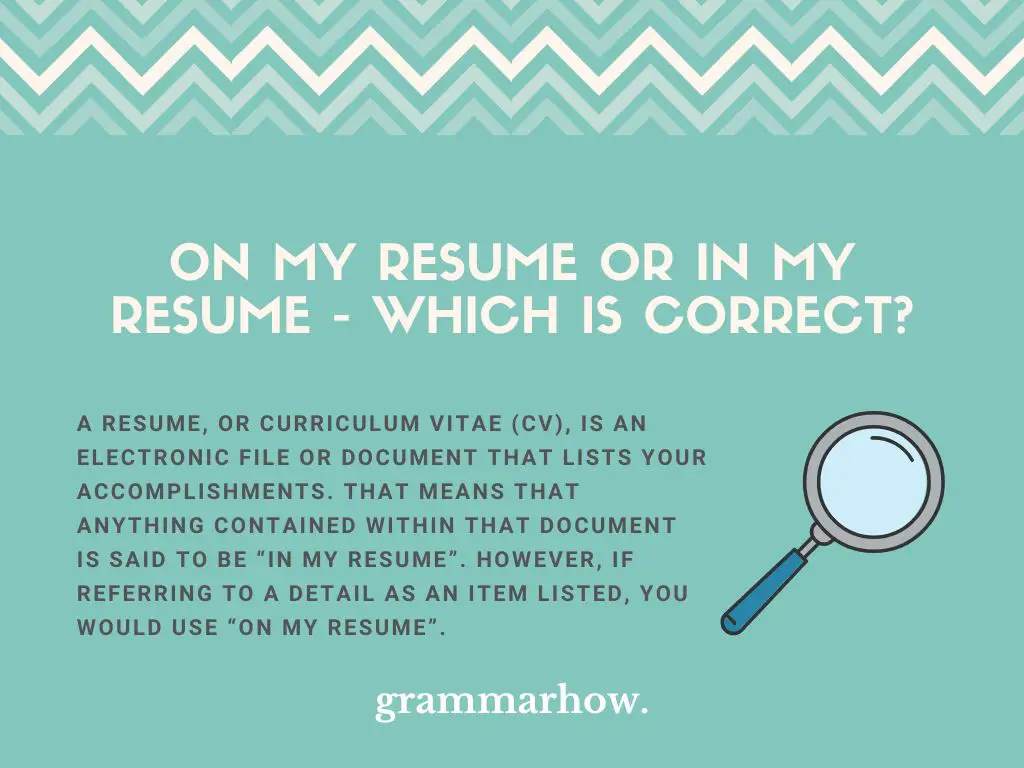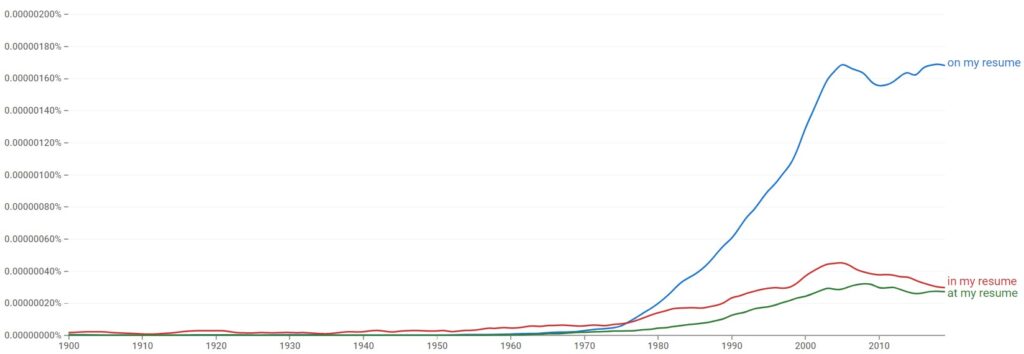When referring to any of the details of a resume, it is common to hear those details described as being “in my resume” or “on my resume”, but is there a difference? What does the speaker mean when they choose one phrase over the other?
On My Resume or In My Resume – Which Is Correct?
A resume, or Curriculum Vitae (CV), is an electronic file or document that lists your accomplishments. That means that anything contained within that document is said to be “in my resume”. However, if referring to a detail as an item listed, you would use “on my resume”.

Both phrases are correct and interchangeable, except when the resume is a printed, physical document. Here, anything placed on the item would be “on my resume”. If the resume is on the table, and the cat sits on it, you can say, “The cat is sitting on my resume!”
On My Resume
The phrase “on my resume” is used when you think of your resume as a list. As your career advances, you collect more details “on” that list. Even if your resume is a list, it is also correct to refer to anything in the document as “in my resume”.
Here are a few examples of how to use “on my resume” in a sentence:
- All the occasions where I worked in a similar position are listed on my resume.”
- I can’t remember the name of the company I worked for last summer, but you will find their details on my resume.
- I have included my secondary school qualifications on my resume.
- My current passport details appear on my resume under the section “Visa and Residency Status”
- I have updated all the dates and results of my professional examinations on my resume.
- I don’t remember the details of the work placements, but they are all on my resume.
In My Resume
The expression “in my resume” refers to any piece of information that forms part of the contents of that document. It is correct to use this expression to refer to any item, such as a list of qualifications or experience, a photograph or dates and contact details.
Here are some examples of how to use “in my resume” in a sentence:
- I have just received my master’s degree in Education; I must remember to put it in my resume!
- The company asked me to list all my previous employers and past experience in my resume.
- Do you think I should include a recent photograph in my resume?
- You will find all the details of my education history in my resume.
- He didn’t include his time spent as a shop assistant in his resume as it was not relevant to the jobs he was applying for.
- She told me that there were a few gaps in my resume, and so I would like to gain some more work experience.
At My Resume
The preposition “at” would appear before “my resume” when using a verb such as “to look at”. This is because the preposition is connected with the verb “to look at”. However, it is not generally correct to say that something is “at my resume”.
Here are a few examples of how the phrase “at my resume” could be used in a sentence:
- If you want to know more about my previous experience in engineering, then take a look at my resume.
- The Head of Human Resources promised me that she would take a look at my resume.
- The interviewer said he was impressed when he looked at my resume and he wanted to know more about my work experience.
- She was glancing quickly through a pile of applications for the post, but she stopped at my resume.
- If you are not too busy, I would be very grateful if you could take a look at my resume this morning.
- The panel expressed their surprise at my resume and called me in for an interview.
- The manager wanted to know more about what was on my resume and so he said he would take a look at it later.
Which Is Used The Most?
Of the phrases “in my resume”, “on my resume” and “at my resume”, Google Ngram Viewer clearly shows that “on my resume” is, by far the most frequently used expression.

This could be because we tend to view the resume as a list of accomplishments or information, and “on” is the common preposition for anything on a list.
The phrases “In my resume” and “at my resume” each appear as often as each other but occur much less often than “on my resume”.

Martin holds a Master’s degree in Finance and International Business. He has six years of experience in professional communication with clients, executives, and colleagues. Furthermore, he has teaching experience from Aarhus University. Martin has been featured as an expert in communication and teaching on Forbes and Shopify. Read more about Martin here.
